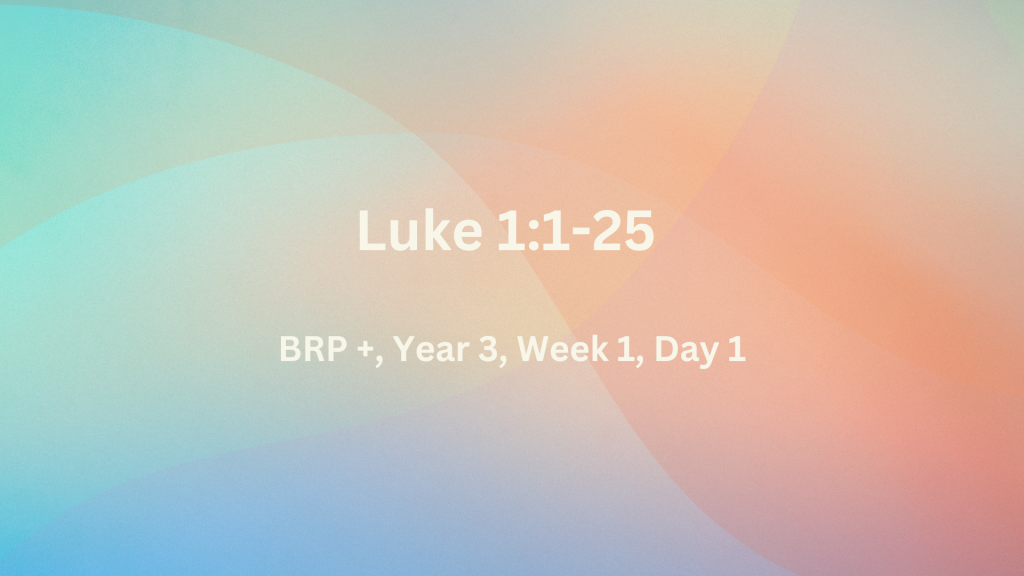Luke 1:1-25
Q.1. Why did Luke write his Gospel account? What were his credentials? What makes his Gospel unique and different? – (Lk.1:1-4)
Luke actually spelled out his reason for writing as – 3 it seemed fitting for me as well, having investigated everything carefully from the beginning, to write it out for you in consecutive order, most excellent Theophilus 4 so that you may know the exact truth about the things you have been taught (Lk.1:3-4). Luke was a non-Jew and an eyewitness of the events, as well as a doctor and travelling companion of Paul (see Lk.1:2; Acts 16:10-17; 20:5-21:18; 28:16; Col.4:14; 2 Tim.4:11). Luke wrote primarily to Greeks. This explains why he gave less references to the Old Testament, and his inclusion of many parables to impress the philosophical minds of the Greeks. We have many details of the life of Jesus which we otherwise would not have had if Luke had not given us his Gospel.
Q.2. What kind of people were Zacharias and Elizabeth? What was Zacharias doing? Why did the archangel, Gabriel visit him? – (Lk.1:5-13)
Zacharias and Elizabeth were both from priestly descent, and – they were both righteous in the sight of God, walking blamelessly in all the commandments and requirements of the Lord (Lk.1:6). Though old in years, they had continually petitioned God because they were childless (see Lk.1:7 & 13). As a priest, Zacharias was working at the time according to the priestly roster and was chosen to make the incense offering in the temple (see Lk.1:8-10). While performing his duties, he was visited by Gabriel in answer to his prayers. Gabriel announced that – your wife Elizabeth will bear a son, and you will give him the name John (Jn.1:13).
Q.3. What was he told about their son? What was John’s role to be? Did Zacharias believe Gabriel’s promise? – (Lk.1:13-20)
Gabriel announced that their son John would bring them and many other people much joy – 15 He will be great in the sight of the Lord; and he will drink no wine or liquor, and he will be filled with the Holy Spirit while yet in his mother’s womb. 16 And he will turn many of the sons of Israel back to the Lord their God. 17 It is he who will go as a forerunner before Him in the spirit and power of Elijah, to turn the hearts of the fathers back to the children, and the disobedient to the attitude of the righteous, so as to make ready a people prepared for the Lord (Lk.1:15-17 c.f. Mal.4:5-6). John would be separate as were those taking a Nazarite vow, and he would abstain from wine and strong drink (see Lk.1:15 c.f. Num.6:1-4). He would be filled with the Holy Spirit to accomplish his calling, and he would especially unite families to prepare for the coming of the Lord (Lk.1:15-17). In spite of this special visitation, Zacharias struggled to believe Gabriel’s good news, so was left mute until the promise was fulfilled (see Lk.1:18-20). Gabriel is an archangel – who stands in the presence of God (Lk.1:19 c.f. 1 Thes.4:16; Jde.1:9).
Q.4. What impact did the muteness of Zacharias have on the people? How did Elizabeth respond to her pregnancy? – (Lk.1:21-25)
When Zacharias was delayed in returning and was unable to speak, the people concluded – that he had seen a vision in the temple (Lk.1:21-22). There had been no prophetic voice for some four centuries since the book of Malachi was completed, so the unique events surrounding the conception of John left the people discussing – What then will this child turn out to be? For the hand of the Lord was certainly with him (Lk.1:66 c.f. 1 Sam.3:1). Childlessness is always painful. It was especially so in Israel, because the inheritance in the Promised Land was passed on through children, particularly the sons. After waiting so long, Elizabeth exclaimed triumphantly – This is the way the Lord has dealt with me in the days when He looked with favour upon me, to take away my disgrace among men (Lk.1:25).

